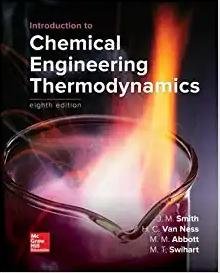Answered step by step
Verified Expert Solution
Question
1 Approved Answer
4. Diffusion is the mass transfer process where the movement of a species in free space occurs via molecular motion. The ideal process is governed

4. Diffusion is the mass transfer process where the movement of a species in free space occurs via molecular motion. The ideal process is governed by Fick's first law: N=DdxdC where N is the molar flux of the species (moles m2s1 ), D is the diffusion coefficient (m2s1),C is the concentration (moles m3) and x is the spacial coordinate (m) ). In a fixed bed catalytic reactor, fluid travels around particles and generates a very narrow layer of stagnant fluid at the particle surface. (a) Draw a diagram of a single catalyst particle and the surrounding fluid, indicate on this diagram the relative concentration profiles that would be expected. [3 marks] (b) Representing the concentration in the bulk fluid as CAb for species A and the catalyst surface concentration as CAS, show that the rate of mass transfer for species A from the bulk fluid to the catalyst surface is represented by: N=hD(CAbCAS) [3 marks] (c) Frossling proposed a Sherwood correlation for the mass transfer coefficient in packed bed reactors as: Sh=2+0.6(Re)0.5(Sc)0.33 where Sh=DhDdp,Re=vudp,Sc=Dv,dp is the diameter of the catalyst particle (m),u is the fluid velocity (ms1) and v is the kinematic viscosity (m2s1). A catalyst bed contains spherical particles of 1cm diameter suspended in a large body of fluid. The reactant is present in dilute concentration and the reaction is considered to take place instantly at the external surface of the catalyst. The bulk concentration of the reactant is 1.0M and the liquid velocity is 0.1ms1. The kinematic viscosity is 0.5106m2s1 and the diffusion coefficient of the reactant is 11010m2s1
Step by Step Solution
There are 3 Steps involved in it
Step: 1

Get Instant Access to Expert-Tailored Solutions
See step-by-step solutions with expert insights and AI powered tools for academic success
Step: 2

Step: 3

Ace Your Homework with AI
Get the answers you need in no time with our AI-driven, step-by-step assistance
Get Started


